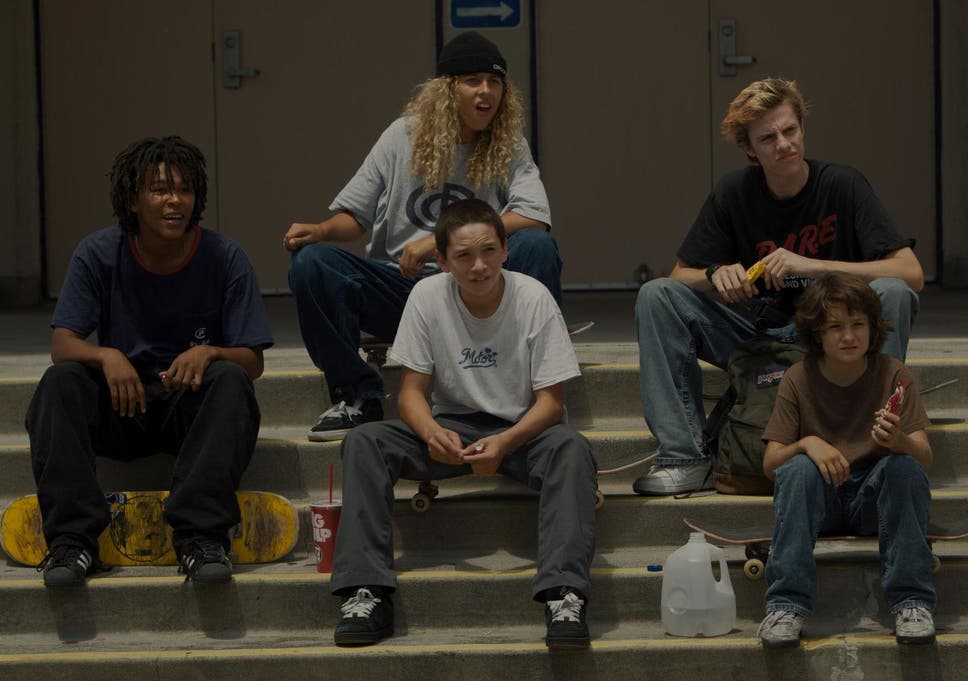With the title of his directorial debut Mid90s, the actor Jonah Hill pins down exactly where pop culture has got up to in the process of devouring itself, the result of creatives nursed on grunge and Britpop reaching an age where they might be rewarded handsomely for regurgitating their experiences and influences. Captain Marvel, directed by the 42-year-old pair of Anna Boden and Ryan Fleck, parachuted its heroine into a world of True Lies standees and Smashing Pumpkins flyposters; with last year's Bad Times at the El Royale, 44-year-old Drew Goddard returned us to the realms of the twisty Tarantinoid fresco. Hill, a touch younger at 35, has come up with a hanging-out movie of the kind Richard Linklater once made his own with the mid-Nineties double-bill of Dazed and Confused and SubUrbia, adding a dash - but only a dash - of that nitty-gritty out of which Larry Clark fashioned Kids, his notable controversy-magnet of 1995. The film's protagonist Stevie (newcomer Sunny Suljic, nicely serious) emerges from a lopsided if not entirely broken home - single mother (Katherine Waterston), bullying older brother (Lucas Hedges) - to fall in with L.A.'s skater community, but at the tender age of thirteen, he remains just too young for the hard stuff of the Clark movie; despite the brutal pile-ons his brother subjects him to, the innocence hasn't entirely been knocked out of him. As a slightly older girl at a party puts it: "You're at that age before guys become dicks." Still, rough-and-tumble of one form or another stands between Stevie and the closing credits, and this bruising rite-of-passage forms the dramatic meat of a solid but slender picture.
It may have been the case that Hill undertook this project merely to revisit some choice period soundtrack cuts while whipping a bunch of spotty, smartmouthing kids into a surrogate gang. He's a good deal less skeezy than Clark in his talentspotting, though, and in fact something of Hill's sweet-natured work for Judd Apatow persists in those scenes that find these credibly immature skater boys slumping on beat-up sofas in the skate store one of them tends, discussing such arcane matters as which of their parents they'd rather go down on, and whether black people get sunburn. Having all the time in the world, Hill proposes, allows a boy to sit round talking shit such as this. Within this framework - which arguably stretches back beyond Linklater to the big Wednesdays and endless summers of the Hollywood surf movie - Hill proves himself a keen observer of teenage mores. I liked the montage-description of a party that consists of awkward teens shuffling red solo cups from one part of a suburban kitchen to another (we've all surely been there), and the time and space Hill marks out around Stevie's development allows the film to note small hierarchical shifts within the peer group: how Stevie's arrival on the scene suddenly leaves the group's second youngest Ruben (Gio Galicia) feeling less special, and how group elder Ray (Na-kel Smith) begins to drift away towards kids who can hold their liquor. We're always aware these are characters in transition, feeling out their place in the world.
The film around them itself feels a touch self-conscious. For some reason, Mid90s has been shot in a 4:3 ratio that wasn't, as far as this viewer can remember, a major feature of mid-Nineties cinema, not even the mid-Nineties indie cinema Hill is throwing back to. (TV, maybe.) And, as is so often the case with first- or second-time directors, there's an over-reliance on soundtrack to carry certain sequences. Despite the logo for catnip-for-Film-Twitter producers A24 (lovingly spelt out in discarded boards), Mid90s is dealing in the same juvenilia as Marvel and DC's superhero movies, the work of a creative striving to preserve or recreate some thin sliver of their childhood for the benefit of an audience who wants to feel young again. I found myself wondering why the film couldn't quite process the rage of these boys into either comedy or tragedy; why it's so jarring when the Hedges character puts the smackdown on his younger sibling (shot, cut and Foleyed to suggest something far more traumatising than Wonder Years-y roughhousing) or when Stevie screams at and over his mother. The answer, I think, is that Hill has no answer or explanation for this behaviour; it's just a phase his characters are going through, ergo the film has to see them through, too, no matter that they result in wrenching tonal shifts. In some ways, Hill has been outmanoeuvred by the recent doc Minding the Gap, which joins its skater protagonists at the upper age range of Stevie's crew, and follows them into their first decade as standalone adults, using a similar running time to draw a detailed, affecting portrait of young male lives, rather than the Polaroid-shaped snapshot we're offered here. What Hill captures, with modest assurance, are just the beginnings of that story, the baby steps and schoolboy errors. The real twists and flips of life are yet to come.
Mid90s is now playing in selected cinemas.

No comments:
Post a Comment